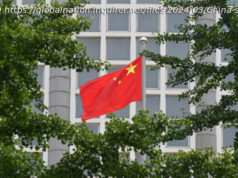The Asian Development Bank’s 50th annual meeting is supposed to be a celebration of Japan’s economic…
By Tetsushi Kajimoto
TOKYO, May 3 (Reuters) – The Asian Development Bank’s 50th annual meeting is supposed to be a celebration of Japan’s economic leadership in Asia over the half-century – instead, it takes place in the shadow of China’s bid to increasingly assert itself as the regional powerhouse.
The ADB is coming off a record year for lending and is the region’s major financier for development, but its four-day meeting in Yokohama starting on Thursday could quickly fade as attention turns to China’s high-profile « One Belt, One Road » (OBOR) summit the next week.
Many OBOR projects are supported by China’s state-owned banks and its fledgling regional lender, the Asia Infrastructure Investment Bank (AIIB) , which could become a potential rival of the Manila-based ADB but for now is much smaller.
« Politically, the AIIB is a direct challenge to the ADB by providing borrowers an alternative, » said Tang Siew Mun, senior fellow at the ISEAS Yusof Ishak Institute in Singapore. « OBOR with AIIB’s deep pockets offers a vision of the region for ‘friendly nations’ to participate. In contrast, the ADB lacks a grand plan and focuses on smaller projects. »
In dealing with the AIIB, which launched operations in January 2016, the ADB has emphasised cooperation rather than competition. A year ago, they signed an agreement setting the stage for joint financing projects.
« Infrastructure needs are huge and it’s simply not possible for the Asian Development Bank and the World Bank to fill the gap completely, » Bank of Japan Governor Haruhiko Kuroda, a former head of the ADB, said earlier this week.
The AIIB is viewed by some as a challenger to both the Western-dominated World Bank and the ADB, which is primarily funded by Japan and the United States.
The ADB was established as a Japanese initiative in 1966 to offer development assistance in Asia. All of the ADB heads up until now have been Japanese, including current president Takehiko Nakao.
Last year, it extended a record $17.5 billion worth of loans to 67 projects, dwarfing the AIIB, which provided loans of about $1.7 billion to just nine projects last year, most of which was through co-financing with other institutions, including the ADB.
OUTWARD SUPPORT
While outwardly Japan has shown support for China’s initiatives, it remains wary of getting too close, and has not joined the AIIB.
« We remain cautious about AIIB and need to examine its transparency even more closely since China plays a dominant role in its governance, » Masahiko Shibayama, an adviser to Prime Minister Shinzo Abe, told Reuters.
Further complicating matters for Japan, is the sudden friendliness of U. S. President Donald Trump to Beijing and a shift by Southeast Asian nations towards China.
The secretary-general of Japan’s ruling Liberal Democratic Party, Toshihiro Nikai, will attend the OBOR summit, a sign Abe wants to improve ties with Beijing.
« The unexpected improvement in ties between China and the United States has prompted Japanese government to send… Nikai to the OBOR summit, » said Xiao Minjie, senior economist at SMBC Nikko Securities in Tokyo.
« Even though bureaucrats in general have an instinctive dislike for China-led AIIB and OBOR. »
Xiao predicts that the two development banks may fill different roles, with the ADB supporting projects concerning the environment, education and poverty-reduction, while China may focus on the kind of infrastructure-tied loans to developing countries that Japan used to provide in the 1980s.
« The ADB will likely shift more towards ‘soft’ infrastructure development, as demand for hard infrastructure runs its course and as Asian countries mature after experiencing high economic growth, » Xiao said. (Additional reporting by Stanley White, Leika Kihara, Izumi Nakagawa; Writing by Malcolm Foster; Editing by Sam Holmes)






